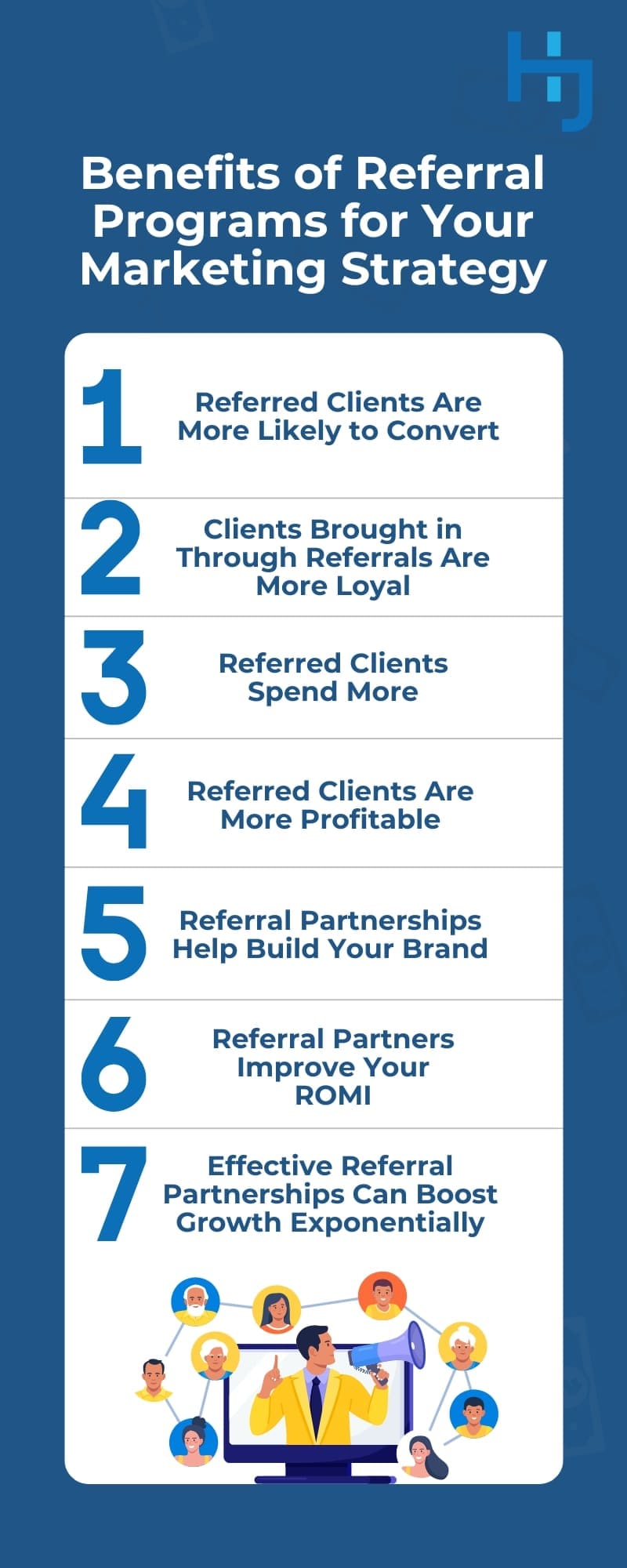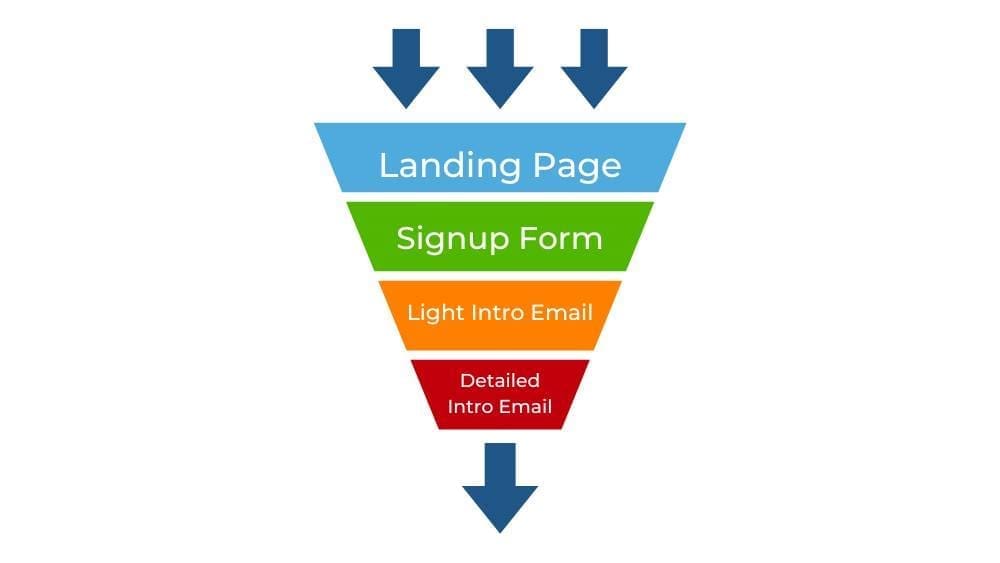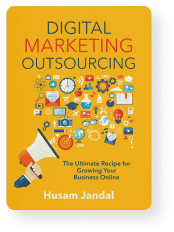
Referral partner programs are digital marketing powerhouses, allowing businesses to increase sales dramatically and improve metrics like retention. I’ve personally seen these programs help businesses scale exponentially as a digital marketing consultant. However, many businesses struggle in this area. They don’t always know where to start or have trouble identifying why their referral partner program isn’t delivering the results it should.
On this page, I’ll explain what makes referred clients so different from others and why they’re crucial to business success. I’ll also share some of the techniques I personally use when creating referral partner programs for my clients, so you can set up or troubleshoot your own and start doubling your sales right away too.
How Does a Referral Partner Program Work?
People are talking about your business and businesses like yours. A formal referral partner program allows you to take control of the narrative and encourages people to send prospective clients your way. The most effective referral marketing programs usually include some type of reward, commission, reciprocation, or another incentive for the referral partner. This increases participation, yet still allows for ample return on investment (ROI) when calculated properly.
Referral Partnerships vs. Affiliate Programs
Referral partnerships and affiliate programs can seem similar on the surface because both involve incentivizing a third party to send you referrals. However, referral partnership programs are more formal. You’ll teach your referral partners about your business, who you help, and how you can help them. That way, they can speak about your company accurately and with authenticity. They build rapport for your business and send people who are primed to do business with you. Because of this, a referral marketing program works better and is cost-effective.
Affiliate marketing doesn’t have the same personal touch or one-on-one aspect. Affiliate marketers usually leverage content to convey a message and put it on the web where anyone can read it. When someone reads the content and clicks a link to the business or makes a purchase, the affiliate marketer receives a payment.
Let’s say your business is growing, and you want to work with a staffing agency that can help you scale up. You start researching online and come across an article that discusses the top ten staffing agencies in your city. One of the agencies seems like it’s a good fit, so you click a link to learn more and schedule a consultation. But, you’re not ready to move forward. You’re still not sure you trust this business. You probably have many questions about how they operate and whether they can meet your needs. That company will still have to work hard to earn your business.
Now, let’s say you’re talking to your accountant “John” about your growth plan, and John says, “I know this great staffing agency that’s helped some of my other clients. Their rates are reasonable, and they always send the best people.”
John’s recommendation means more to you, doesn’t it? That’s what sets referral marketing apart from affiliate programs. Both can help, but referral partners will deliver higher-quality leads.
Do Referral Partnerships Only Apply to Customers?
Up to 80 percent of referrals come from current or past customers, according to McKinsey, but they aren’t your only target audience.
Many businesses work with organizations that share their customer base but don’t have overlapping services. For example, if you offer small business loans, you might invite attorneys or CPAs who serve small businesses to participate in your referral partner program.
Some businesses also partner with competitors. Using the small business loan example again, perhaps your company works with startups and entrepreneurs who don’t have a strong financial footprint yet and are typically denied loans. You may develop partnerships with traditional lenders who can send you their disqualified leads. I explore this solution a bit in “What Should You Do with Unqualified Leads?”
Benefits of Referral Programs for Your Marketing Strategy

Developing a referral-based marketing strategy is one of the best things you can do to improve your overall marketing because referred clients behave differently than their counterparts.
Referred Clients Are More Likely to Convert
Eight in ten consumers say they trust word-of-mouth recommendations from friends and family more than any other source of information, according to Nielson research. Referred customers also come primed with positive sentiments and are more ready to do business, so they’re three to five times more likely to convert per Annex Cloud.
Clients Brought in Through Referrals Are More Loyal
Churn rates are about 16 percent lower when customers are referred, according to Wharton research. In similar studies performed by Deloitte, the figure jumps to 37 percent when the referral partner is also a loyal client.
Referred Clients Spend More
The average lifetime value of a referred client is about two times higher than those attracted through other marketing channels, per research published in the Journal of Marketing.
Referred Clients Are More Profitable
Referred clients are about 25 percent more profitable than their counterparts, according to Wharton. The greatest benefit is seen during the first year after acquisition, though it continues for some time after.
Referral Partnerships Help Build Your Brand
The average person mentions 56 brands per week in conversation, according to Deloitte. Simply being part of these conversations is huge for brand building. Yet, referred clients also bring in twice as many new referred clients as their counterparts, per the Journal of Marketing’s research.
Referral Partners Improve Your ROMI
Businesses receive a 60 percent greater return on marketing investment (ROMI) from their referred clients, according to Wharton. This is true even when referral partners receive a monetary reward for referring.
Effective Referral Partnerships Can Boost Growth Exponentially
A well-built referral partner program builds on itself. You spend less acquiring and converting. Referred clients spend more, stay with you longer, and bring more people to your brand. The result is exponential growth while spending less on acquisition and retention.
Tips for Setting Up a Successful Referral Partnership Program
You’ll need to develop a formal referral partnership strategy to see the kinds of results highlighted above. Use the steps below as a guide as you set up your own.
Design Your Process
The first step is designing your process.
- Program Details: Consider what type of reward a referral partner will receive when someone they send signs up for your services or makes a purchase. Look at the lifetime value of referred clients to establish a reward that makes sense. Also, work out when and how referral partners will receive their rewards.
- Segments: Focus on broad groups to start rather than individual businesses since each group will require a slightly different message. For example, you may have individual segments comprised of accountants, consultants, competitors, or current clients.
- Technology: You’ll need to manage your contacts, track what’s happening with each one, and be able to see broad metrics about the effectiveness of your overall program and individual campaigns. Most CRMs can handle this, particularly if they offer integrated marketing.
Identify Key Players on Your Team and Train Them
Because you’ll be onboarding referral partners and different team members may interface with referral partners at different stages of their journeys, the team should be trained on how the program works. Invest time in getting them excited. It makes all the difference in the world when they’re outlining the program to potential candidates.
Identify Potential Referral Partnerships
Ideally, you’ll reach out to people and businesses you already know to start. Once you’ve exhausted existing contacts, you can explore reaching out to warm and cold contacts. Gather as much data as you can on each prospective referral partner, including industry, company name, target market, role within the company, and so forth. This will help you send more personalized messages and target your messages with greater accuracy over time.
Build a Funnel
Building out your referral marketing strategy is like building out any other digital marketing campaign. Most prospects won’t be ready to start referring right away, so you’ll be building and nurturing these relationships. A few things to create include:

- Landing Page: Prospective referral partners need a place to go for more information. You may need to create multiple landing pages to ensure each segment has content that resonates with them.
- Signup Form: Your landing page should have a basic signup form that invites the prospective referral partner to take the next step. They’re probably only ready to learn more, take a product demo, or have a conversation at this point, so be mindful not to push them toward a formal commitment or agreement at this point.
- Light Intro Email: I always begin with a light intro when I’m reaching out to a prospective referral partner for the first time. It only includes a few lines that tell them why the business is reaching out to them and invites them to learn more. It also gives them the opportunity to opt out of future messages. This is important for legal compliance and helps solidify the business as a professional entity rather than a spammer.
- Detailed Intro Email: A more detailed intro, with information on the business, who it helps, and why they should become a referral partner, go out next.
Formalize Your Partnership Agreement
Referral partnership agreements outline what your business is offering and what kind of timeline referral partners can expect. Always have referral partners review and sign a contract prior to offering any kind of reward. It can help with any kind of legal concerns and ensures you’re all on the same page.
Onboard and Train Referral Partners
All new referral partners should participate in some type of demo or presentation that covers your offerings and the partnership agreement. This should get them excited about participating and ensure they’re sharing accurate information with the people they’re referring.
Equip Referral Partners with the Tools They’ll Need to Be Successful
The easier you make it for your referral partners to spread the word, the more they’ll refer. Providing your partners with marketing assets also ensures all channels are sending the same cohesive message.
- Web Page Content: Although you can design pages for individual referral partners on your own website, it’s a good idea to provide partners with ready web page content for their own sites too. That way, their clients can discover the information without any additional effort. This approach can help build more trust too.
- Social Media Posts: Create packages of images and written posts optimized for each network that announce the new referral partnership for your partners to share on their own social media accounts. Be sure to include your handles so they can tag you.
- Email Announcement Template: Make it easy for referral partners to announce the new partnership with their email lists by crafting the content for them.
Leverage Attribution
Ensure your referral partners all have specialized links with UTM codes that make it easy for your marketing team to identify the referral source. That way, you can still give your partners credit for referrals even if the client can’t remember who sent them, and you’ll have data on who’s sending the most referrals. This will help you refine your funnels if people aren’t converting or reaching out to you after being referred.
Show Gratitude to Your Referral Partners
In addition to sending commissions or referral rewards, be sure to personally thank referral partners each time they refer someone. It’s also a good idea to send periodic updates that show them how many people they’re referred and let them know you appreciate that they’ve helped you grow.
Some businesses go the extra mile by highlighting referral partner stories. For example, you may draft a referral partner case study that highlights someone’s success with your program or mention your top referrers in a special email campaign.
Keep Lines of Communication Open
Nurture your referral partners, and referral partner leads on a regular basis. This will keep you top of mind when they have someone to refer and will nudge them toward a formal partner relationship. Continue sending insights, case studies, referral partner success stories, and fresh social media content with special tracking links for each referral partner.
Automate
Automation makes managing your referral partner program easy without investing a lot of time. A few things you can automate include:
- Progress updates and reminders in CRM.
- Emails, such as thank you notes when a referral contacts you or converts, and messages to keep your partners motivated.
- Internal reports, such as total referrals, deals, and commissions.
Develop a Referral Program That Works
Because referral marketing strategies are highly effective and deliver incredible ROMI, they’re one of the first things I set up for my clients as a digital marketing consultant. If you’re not sure how to set yours up or aren’t getting the return you deserve from yours, please contact me for a complimentary consultation.




































































